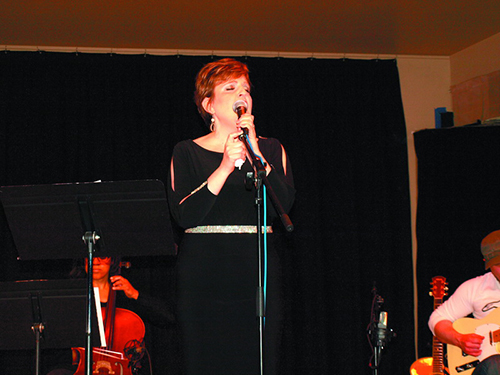
Apologizing for her voice, which needed no apology, Rebecca Teplow sang for an audience of about 200 people on March 9 at the Eric Brown Theater in the Kaplen JCC on the Palisades in Tenafly.
“A strange thing happened to me two weeks ago,” she said in explanation. “I decided to start intense weight lifting to get into shape for this concert. I came home that night and all of a sudden, I couldn’t speak. My voice was gone.”
She was told by her otolaryngologist that weightlifting is forbidden to singers and can cause severe damage.
“The doctor told me to cancel the concert. I had to work very hard to get my voice back and I had to succumb to the idea that I need not be perfect.”
However, Teplow makes lessons out of the events of her life and this was no exception. “My voice is simply on loan from God,” she said. “In the end we’re imperfect beings.”
However Teplow’s voice, her words, and her songs, were only one of the instruments demonstrating her talent. Teplow composed the music to her songs as well as writing the arrangements which spoke just as well, just as eloquently, of what she felt when she sang and the messages she wished to convey with the traditional prayers she had set to her own music. The prayers spoke of the coming of the Messiah, putting faith in God, tikkun olom, finding personal joy by surrendering to personal sorrow, facing fear with perfect faith, praise to Elohim, and of course the Shema.
In interviewing members of the audience—who were mostly aged 40 to 80—all seemed to know of the debate concerning men listening to women sing. Nevertheless, there were a goodly number of men present, not all as vocal as the women.
Bernice Greenberg of Teaneck was asked what she thought of the debate. “I feel that it is against everything that should be equal in Judaism. I was very upset when I heard that she was not allowed to sing in a mixed audience andsince this is her first concert I was worried that a lot of Orthodox people would not attend because of that. But I see that a number of them have. We are among those. I am not Orthodox. I am Modern Orthodox; this is how I’ve already felt, as far as women davening, women singing, why not. If they have the knowledge and the wisdom, they are equal.”
Greenberg’s husband, Mishel, had a slightly different view, understanding if some wanted to stay away. “They’re concerned about changes that might lead to other changes. I believe that what was once contemporary opinion influenced some of those judgments. I don’t know the source. I’m not enough of a scholar to know the halachic sources, but I suspect it may have been influenced simply because they lived in a time and place that felt that way.”
Deborah Wanger of Teaneck, a member of JOFA (Jewish Orthodox Feminist Alliance)— the recipient of the proceeds from the concert—said that, “Halachically, when women are singing of Jewish related subjects that are not intended to be seductive or enticing, when they’re trying to be spiritual, there’s absolutely nothing wrong with it. If a man has a problem with it, he’s welcome not to come.”
Glen Shepherd of Teaneck said it’s all about personal belief. “My feeling is that a woman with talent, which is what Rebecca Teplow represents, should be enjoyed for what she’s trying to deliver, which is inspiration on a personal level, on a religious level. It doesn’t really matter what I think, what matters is that she’s trying to present a great talent for people to enjoy. I think this is a great context for people to enjoy it and I’m certainly going to enjoy it.”
Each of Teplow’s songs was a prayer with inspiration coming from the great sages of the past as well as the present, Psalms, and passages from the Torah. Before each song, Teplow explained the prayers. “While each of us waits for the Messiah, hoping that the world can change, each one of us is an appointed to bring redemption closer by godly actions. Some people think they will meet God in the afterlife. But the truth is if you can’t meet God in the here and now then we’ll have a very difficult time meeting God in the afterlife.”
Teplow also used personal experiences to explain the meaning of the prayers she sang. Recalling a concert she gave of original music, she said as the curtain parted and she viewed the audience, she forgot all her songs. “At that moment I realized I would have to totally surrender my ego, let go and trust God. With perfect faith, I put my fingers on the keyboard and a miracle happened.” Her fingers touched the right keys. “I suddenly experienced myself as the instrument of God. God was playing through me. All I had to do was get my ego out of the way.”
Joining Teplow on stage were David Morgan at the piano, Chris Russo at the guitar, Melissa Westgate at the cello, and Rebecca’s daughter Tamara on the flute.
By Anne Phyllis Pinzow










